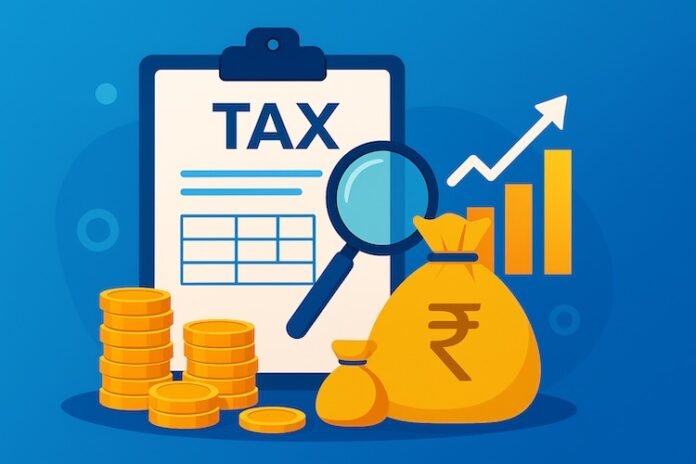Introduction
Tax planning is a critical aspect of financial management for high-income earners in India. Wealthy people have special taxing needs and requirements. Tax management guarantees legal compliance, wealth preservation, and financial well-being.
In India, the Income Tax Act oversees taxation. High-income individuals must comprehend these laws to prepare their taxes. Tax management requires being aware of tax legislation developments.
Optimizing compensation structure is crucial to high-income tax planning. Individuals can benefit from tax exemptions and deductions through structuring allowances, perquisites, and reimbursements during the e-filing of income tax returns. This reduces their taxable income and tax liabilities.
Tax deductions under various Income Tax Act provisions are also crucial. High-earners can deduct medical insurance premiums, charity donations, house loan interest, and school loans. Documenting qualified costs and keeping supporting papers can dramatically lower taxable income.
High-earners could also investigate government-sponsored tax-saving investments. PPF, NSC, and ELSS investments give tax benefits and wealth building.
Strategies for High-Net-Worth Individuals
Here are some of the strategies for HNIs to help in their tax planning:
1. Understand the Tax Laws
High-income Indians must understand tax regulations to prepare their tax tactics. The country’s main tax law is the Income Tax Act. People must grasp this act and its contents for informed judgments and tax optimization.
High-earners should study the Income Tax Act. Staying up-to-date with government and tax agency developments is crucial while online filing of ITR.
Tax specialists specializing in high-net-worth individuals are suggested to help negotiate the tax regulations. These tax experts can personalize advice to an individual’s finances and aspirations.
High-earners may optimize taxes by knowing exemptions, deductions, and tax-saving investments. Taxpayers can prevent penalties and legal issues by knowing their rights and responsibilities.
2. Optimize Salary Structure
High-income Indians optimize their wage structure for tax planning. Allowances, perquisites, and reimbursements can reduce tax burdens. It entails matching pay component tax exemptions and deductions with personal financial goals.
Maximizing tax-free allowances and using exemptions for medical reimbursements and trips can lower taxable income. Tax specialists assist high-net-worth individuals in choosing the most tax-efficient wage structure that meets legal and financial goals when e-filing income tax returns.
3. Leverage Tax Deductions
High-income Indians should maximize tax deductions. Using Income Tax Act deductions can dramatically reduce taxable income and tax burden.
High-earners can take multiple deductions. Medical insurance premiums, charitable donations, and student loan interest payments can be deducted. For tax assessments, these deductions must be documented and supported.
Reducing taxable income by properly identifying and recording qualified expenses optimizes tax planning. They can keep more money while complying with tax laws.
4. Invest in Tax-Saving Instruments
High-income Indians plan their taxes by investing in tax-saving tools. The government offers tax-advantaged investments. Strategically deploying cash to various products can lower taxable income and increase investment returns.
PPF, NSC, and Equity-Linked Savings Scheme (ELSS) are popular tax-saving schemes. These vehicles offer tax benefits and long-term wealth growth.
Tax-deductible donations to the PPF receive tax-free interest over time. NSC offers a set return and tax deductions under Section 80C of the Income Tax Act.
ELSS is a tax-saving mutual fund that lets people invest in stock markets. ELSS investments qualify for Section 80C deductions and long-term capital gains tax.
Before investing in tax-saving products, evaluate their risk-return profiles and match them to financial goals and risk tolerance. Financial advisers and tax specialists may assist investors and tax planners in making smart choices.
5. Utilize Capital Gains Tax Exemptions
Long-term equity gains and Section 54 exemptions for residential property transactions are capital gains tax exemptions. Timing investments and knowing holding period rules can reduce or delay capital gains tax payments.
6. Establish Trusts and Estate Planning
Establish a trust to safeguard and share your wealth while reducing taxes. Trusts may help families transfer money by reducing taxes and improving estate planning. For legal compliance and a customized trust arrangement, consult a lawyer.
7. Offshore Investment Considerations
Offshore investments may present tax planning opportunities for high-income earners with international exposure. However, it is essential to understand the regulatory and tax implications associated with such investments. Consult with tax advisors specializing in cross-border tax planning to ensure compliance with domestic and international tax laws.
8. Charitable Contributions and Philanthropy
High-earners may use their riches to give back and get tax breaks during the e-filing of income tax returns. Donate to Section 80G-exempt registered charities. Supporting your values reduces your taxable income and improves society.
For tax deductions, save donation receipts and acknowledgments. Create a charitable trust or private foundation to organize giving and maximize tax advantages. Consult tax and legal experts to comply with requirements and optimize charity contributions.
9. Regular Tax Review and Monitoring
High-income individuals should frequently assess their tax planning techniques to meet financial goals. Track tax rules, exemptions, and deductions to alter your tax strategy.
Monitor your income, assets, and spending for optimization opportunities and compliance issues. To keep informed and solve tax issues, consult high-income tax consultants. Periodic tax evaluations help you anticipate changes and maximize your tax status.
Conclusion
Effective tax planning is vital for high-income earners in India to optimize their tax liabilities, preserve wealth, and ensure compliance with tax laws.
By staying informed about tax regulations, leveraging deductions and exemptions, and seeking professional advice, wealthy individuals can maximize their financial well-being and contribute to their long-term financial goals.

